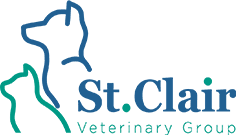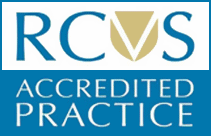We vaccinate puppies from eight weeks of age, though it is possible to start at 6 weeks in high risk situations.
The primary course consists of two injections two to four weeks apart. Puppies receive antibodies against diseases in their mother’s milk and so it is when these start to wane that we inoculate them. The diseases we vaccinate against are:
Canine Parvovirus - the most serious disease seen regularly. It causes vomiting and diarrhoea which can lead to rapid dehydration and death. The virus is found everywhere and can survive in the environment for many months, which means your dog doesn’t even have to meet another dog to catch it. We strongly recommend a third Parvovirus injection at 16 weeks of age since on rare occasions, young dogs about one year of age may still contract the disease if exposed to the virus, even if they have had both primary puppy injections.
Canine Distemper - less commonly seen but just as dangerous. It causes many signs including fever, runny nose, diarrhoea and fits. Again, it can be fatal but even if the dog survives it may be left with permanent brain damage.
Infectious Canine Hepatitis - as the name suggests it is a virus which attacks the liver. It may also affect the respiratory tract. The virus can kill.
Leptospirosis - is a bacterium which affects the liver and kidney. This condition not only affects the dog, but also can be transmitted to you!
Kennel Cough - There is also a separate intra-nasal vaccine for Bordatella and Parainfluenza virus which we would recommend getting done at the same time as the annual booster (it is also discounted if done at this time). The name 'Kennel Cough' is unfortunate since most of the dogs we see with this disease have never been in kennels! Your pet can contract 'kennel cough' just by passing another dog whilst out on a walk. Most boarding kennels and many dog clubs request kennel cough vaccination. This vaccine gives 12 months protection and can be quickly and easily done at the annual vaccination appointment.
Puppies should be kept indoors or within an enclosed garden which other dogs have no access to until 1 week after the second vaccination. After this time puppies are fully protected and free to go wherever they please. As mentioned above, we strongly recommend a third injection against Parvovirus at 16 weeks of age.
After the primary vaccination course dogs require a single booster injection on an annual basis throughout their lives - it is important not to let this lapse since an unvaccinated adult dog can still contract these diseases. Puppies receive a comprehensive free health check by a veterinary surgeon either at their first vaccination or prior to this if the puppy is younger than eight weeks of age. At the annual booster vaccination, the vet will give your pet a complete examination and will also be able to offer advice or discuss any problems you may have. We will ask about your pet's drinking, eating and toileting habits as well as more general questions about their behaviour and exercise patterns. Quite often information gained from asking an owner about their pet's routines can be vital in detecting early symptoms of disease or illness. A full clinical examination by the vet will follow which will include sounding the heart, listening to the lungfields, checking carefully for signs of problems with the eyes, ears or mouth, assessing joint movement and close inspection of the coat and skin amongst other things. Only once we are satisfied that your pet is fit and healthy will we go ahead and give the necessary vaccinations. The practice will send out vaccination reminder cards to clients just before the annual booster is due to help you remember.





